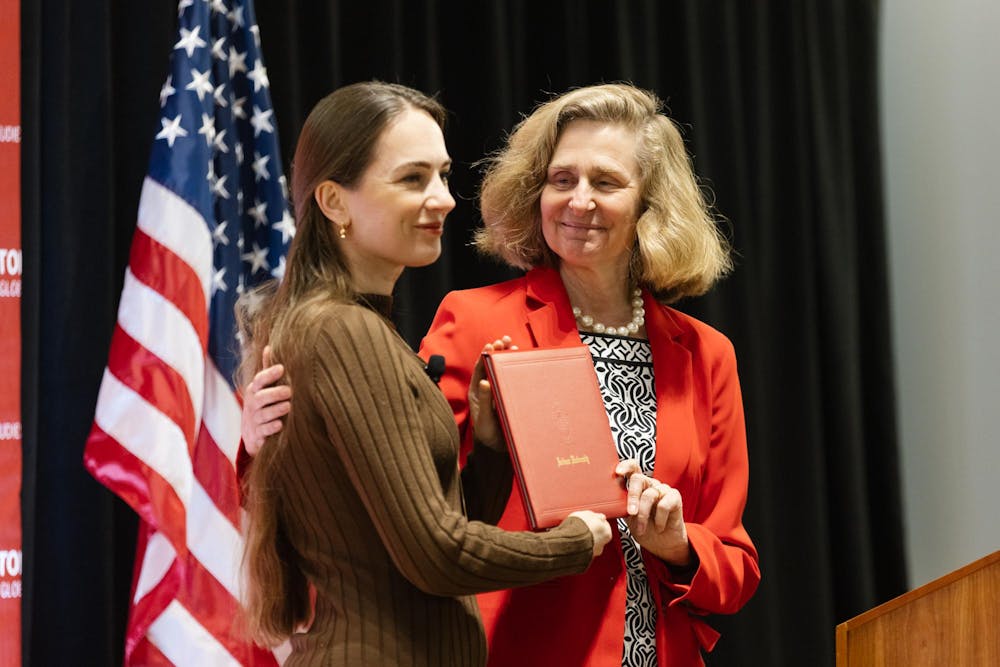Ukrainian Nobel laureate and human rights lawyer Oleksandra Matviichuk accepted the Global Voices for Change award from IU’s Hamilton Lugar School of Global and International Studies on Thursday morning at IU’s America’s Role in the World Conference. She also spoke to an audience of students, faculty and community members about her experience fighting to end the war in Ukraine and the human rights desert left in its wake.
The America’s Role in the World Conference is an annual event hosted by the Hamilton Lugar School that began in 2016. IU hosts international experts on global affairs over two days to speak on relevant world issues. This year’s conference took place Thursday and Friday.
Yaroslav Chalyi, president of the Ukrainian Studies Organization at IU, and IU president Pamela Whitten gave opening remarks before presenting Matviichuk’s award.
“Her unwavering commitment to human rights has inspired countless individuals worldwide to stand up for what they believe in and fight for a more just and equitable society,” Whitten said.
Matviichuk was honored with the Global Voices for Change award in recognition of her contributions to global human rights efforts.
Whitten said Matviichuk was inspired by tales of old Ukrainian political dissidents when she was younger and decided she wanted to be someone who could create political change in the world.
Matviichuk graduated with a master’s degree in law from Taras Shevchenko National University of Kyiv in 2007, after which she joined and became the head of the Center for Civil Liberties founded the same year in Kyiv, according to her Nobel Prize biography.
The mission of the Center for Civil Liberties, according to its website, is to establish human rights and democracy across Europe “for the affirmation of human dignity.”
Matviichuk’s organization has made significant political waves since its inception and been a staunch enemy of Russia and its invasions of Ukraine. In 2014, when Russia annexed the Crimean Peninsula and supported pro-Russian takeover by separatist groups in Donetsk and Luhansk, the Center for Civil Liberties sent teams to document the war and war crimes.
Since Russia’s full-scale invasion of Ukraine beginning February 2022, Matviichuk has been an international spokesperson for Ukraine and called on the UN to take stronger action against Russia’s humanitarian violations.
The Center for Civil Liberties was awarded the Nobel Peace Prize for its coverage of war crimes perpetrated against civilians by the Russian army in 2022. Matviichuk and the organization were the first Ukrainians ever to earn the Nobel Peace Prize.
Matviichuk opened her appearance Thursday with a 7-minute speech condemning Russia and declaring her will to continue fighting for freedom in Ukraine. She also engaged in a conversation with the audience and Politico editor-at-large Matthew Kaminski.
Matviichuk spoke on Russia’s continued campaign against Ukraine and said they were dehumanizing Ukrainian people.
“They were trying to turn people into numbers,” she said. “But people are not numbers.”
Matviichuk and the Center dedicate many of their resources to telling the stories of individuals who have had their human rights violated.
One of the Center for Civil Liberties’ most influential projects was the “Save Oleg” movement. Oleg Sentsov, a Ukrainian journalist and film director, was imprisoned by the Russian government in 2014 after vocally opposing the annexation of Crimea. He was arrested on charges of terrorism against the Russian rule in Crimea, but no link between Sentsov and any terrorist organization was found, according to the European Parliament. The primary witness for the prosecution later confessed he fabricated his testimony due to being tortured.
The Center for Civil Liberties spurred on Save Oleg, a global movement consisting of demonstrations from civilians around the world calling for his release. Eventually, Oleg and 34 other prisoners were released in exchange for an equal number of Russian prisoners in Ukraine.
Matviichuk expressed concern about Russia’s continued provocations against Ukraine and other less powerful nations in the region, such as the Baltic States and the country of Georgia.
“If Putin succeeds, it will encourage other authoritarian leaders in the world to do the same,” she said. “It means that democratic countries will be forced to invest their money not into health care, business development or arts, not in solving global problems like climate change or social inequality, but in weapons.”
The US Senate passed a bill in February allocating $60 billion in aid to Ukraine, but Republican House Speaker Mike Johnson has refused to allow the bill to be voted on in the House of Representatives. Johnson and some other Republicans want the bill to include a package funding U.S.-Mexico border security.
Matviichuk urged listeners to act by sending a letter to their representatives calling for the U.S. to unblock military spending and aid to Ukraine. She said that she still believes Ukraine can prevail in the war against Russia and fight for human rights in the region.
“The truth is, and the whole history of humankind proves, that we have to continue to fight honestly,” Matviichuk said. “The result, even if unexpected, will be achieved.”
CLARIFICATION: This article has been updated to reflect that Yaroslav Chalyi is the president of the Ukrainian Studies Organization at IU.




